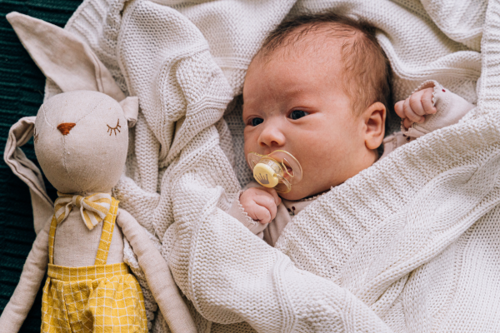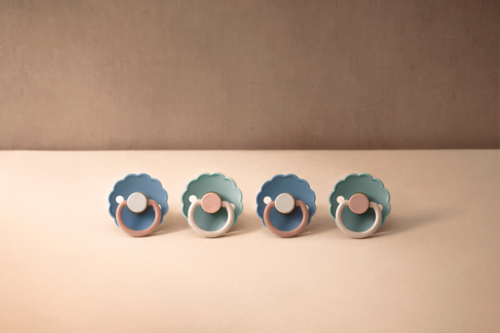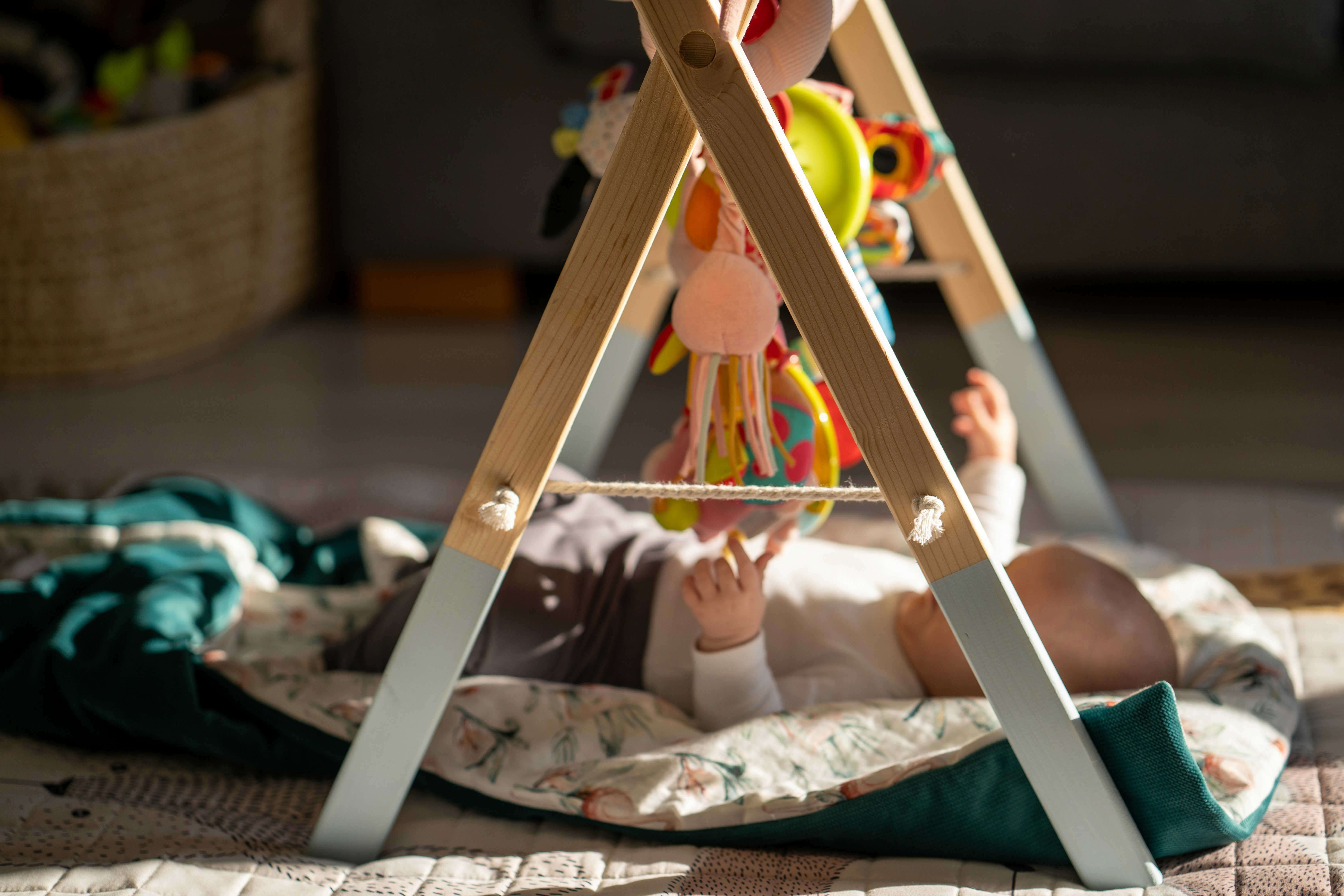Start your wishlist today for free!
A guide to baby dummies and pacifiers: What every parent should know

Amongst the most common questions parents ask are, “Why is my baby crying?", "How can I soothe my baby?" and "Should I give my baby a dummy?”. Unless there are additional needs or health concerns, there are only a few reasons a baby will cry. Typically, a baby cries because they are hungry, have wind, need a nappy change, are tired, are in pain or sick, or want comfort. The last one, understanding how to comfort a baby can be the hardest to solve and can feel like trial and error at times. Over time, however, parents get to know their babies, which becomes intuition.
Baby soothers, often referred to as dummies or pacifiers can help to provide extra comfort to a baby. When teeth start to come through, which can be as early as 4 months, dummies can play a crucial role in soothing babies and providing relief to sore gums. However, many parents have questions about their safety, effectiveness, and when to introduce a pacifier to their little ones. Read on to find out everything you need to know about baby soothers and teethers.
Are dummies good for babies?
The debate around whether to give a baby a dummy has been ongoing for years. While some parents turn to them to calm fussy infants, others argue that dummies or pacifiers have potential drawbacks. So, are dummies good for babies?
Dummies, when used appropriately, can be beneficial for babies and parents. They can provide comfort, help babies self-soothe, and reduce crying episodes, especially during broken sleep. For a sleep-deprived parent, dummies can be a lifesaver. The sucking action can mimic breastfeeding, which can be comforting for babies who are not nursing or those who want to ‘comfort suck’. Additionally, soothers have been linked to a reduced risk of sudden infant death syndrome (SIDS) when used during sleep.
However, prolonged or excessive use of pacifiers can interfere with breastfeeding, hinder speech development, and lead to misaligned teeth.

At what age can a baby use a dummy?
Many parents wonder when is best to use a dummy. While there’s no right or wrong answer, most experts recommend waiting until breastfeeding is well-established before introducing a dummy. Introducing a soother too early may interfere with breastfeeding and cause nipple confusion. That said, in times of desperation, parents might choose to offer a pacifier selectively to soothe a fussy or crying baby.
Is a pacifier good for a baby?
The NHS acknowledges the potential benefits of using pacifiers, however, they also highlight the importance of using them safely and appropriately.
According to the NHS, using a pacifier when putting your baby down to sleep can reduce the risk of SIDS. To prevent choking hazards, they recommend offering a clean, dry soother without any attachments or loose parts, such as ribbons or strings. Additionally, it's essential to ensure that the dummy is the right size for your baby’s age and stage of development.
Medical professionals will equally advise against forcing a baby to take a pacifier if they’re not interested. Every baby is different, and it’s common for a baby to refuse a dummy in favour of sucking their thumb.
What is the difference between a dummy and a pacifier?
The terms ‘dummy’ and ‘soother’ are often used interchangeably, and it really depends on where you come from. Parents in the UK tend to refer to ‘dummies’, whereas in the US and Canada, they are commonly called ‘pacifiers’.
Whatever you call it, a dummy or pacifier is usually made from rubber or silicone formed in a nipple shape designed to soothe a baby by satisfying its instinctive sucking reflex. Pacifiers are commonly used in many parts of the world and are available in various shapes, sizes, and designs.
How to choose the right dummy or pacifier
Dummies or pacifiers trends are changing. Parents are looking for innovative materials and designs when choosing the right dummy for a baby.
Natural and organic materials
With a growing focus on sustainability and eco-conscious parenting, there's a rising demand for dummies made from natural and organic materials. Parents are opting for dummies crafted from materials like natural rubber, organic cotton, and wood, which are free from harmful chemicals and toxins. Not only does this ensure the dummies are safe, but using biodegradable materials such as natural rubber or plant-based plastics appeals to environmentally conscious parents who want to reduce their carbon footprint.
NUK for Nature dummies are made from sustainable materials, including sustainable plastic, natural rubber and sustainable silicone.

Orthodontic designs
Orthodontic dummies are gaining popularity among parents who are concerned about their baby's dental development. These dummies are designed to support natural oral development, promoting proper alignment of the teeth and jaw with a flattened nipple shape that mimics the shape of the breast during breastfeeding.
Parents love Nanobebe dummies for breastfeeding babies.
Personalised dummies
Customised dummies have become a popular choice for parents looking to add a unique touch to their baby's accessories. Many companies offer customisable options, allowing parents to choose the colour and design and even include their baby's name on the dummy.
Innovative features
Some dummies now come with built-in temperature sensors to alert parents if the dummy becomes too hot for the baby's mouth. Another popular choice is glow-in-the-dark dummies handles to help with night.
More high-tech, some companies are introducing ‘smart’ dummies equipped with sensors and Bluetooth connectivity. These dummies can track various metrics, such as the baby's sucking patterns, temperature, and sleep cycles, providing parents with valuable insights into their baby's health and well-being.
Minimalist designs
Minimalist, understated dummies are becoming increasingly popular among parents who prefer a clean and modern aesthetic. These dummies often feature simple colour palettes, geometric shapes, and minimal branding for a more minimalist approach to baby products.
Danish brand BIBS pacifiers offer the iconic round-coloured design made from natural materials and a premium finish. Similarly, FRIGG pacifiers combine soothing comfort, safety, and high-class Danish design.
Overall, choosing whether to give a dummy to a baby is a personal decision. There is no right or wrong - it’s about how to use a pacifier appropriately.
Register with Little Wishlist to curate your dream wishlist and let the gifting magic begin.

Join our newsletter!
Subscribe to our newsletter for exclusive access to kids' wishlist tips, tricks, and the latest deals delivered straight to your inbox.
Follow us on Instagram for more inspiration!
@littlewishlist_
Create your wishlist!
Ready to dive into baby gift bliss? Start your wishlist adventure!






